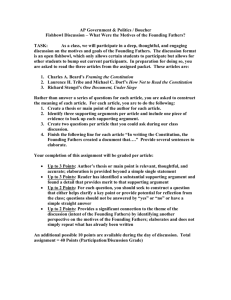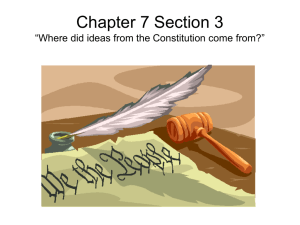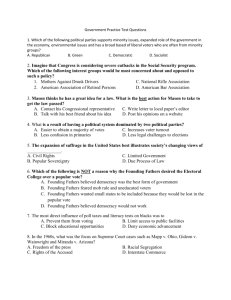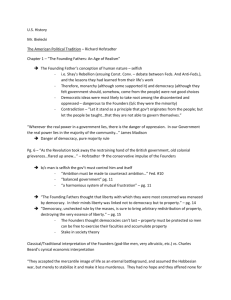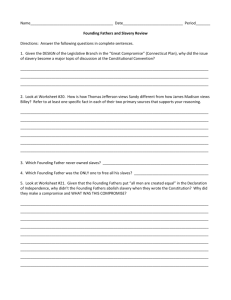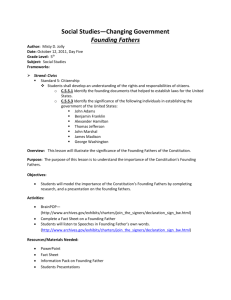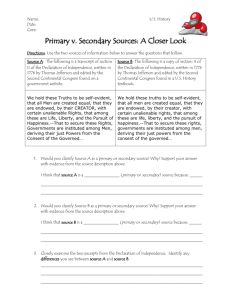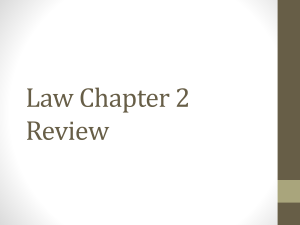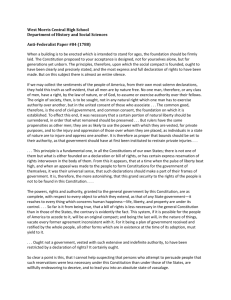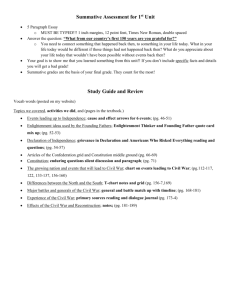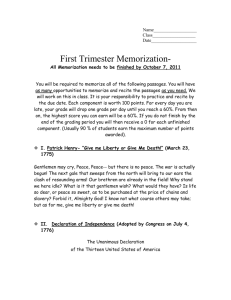Religion in Public Life
advertisement
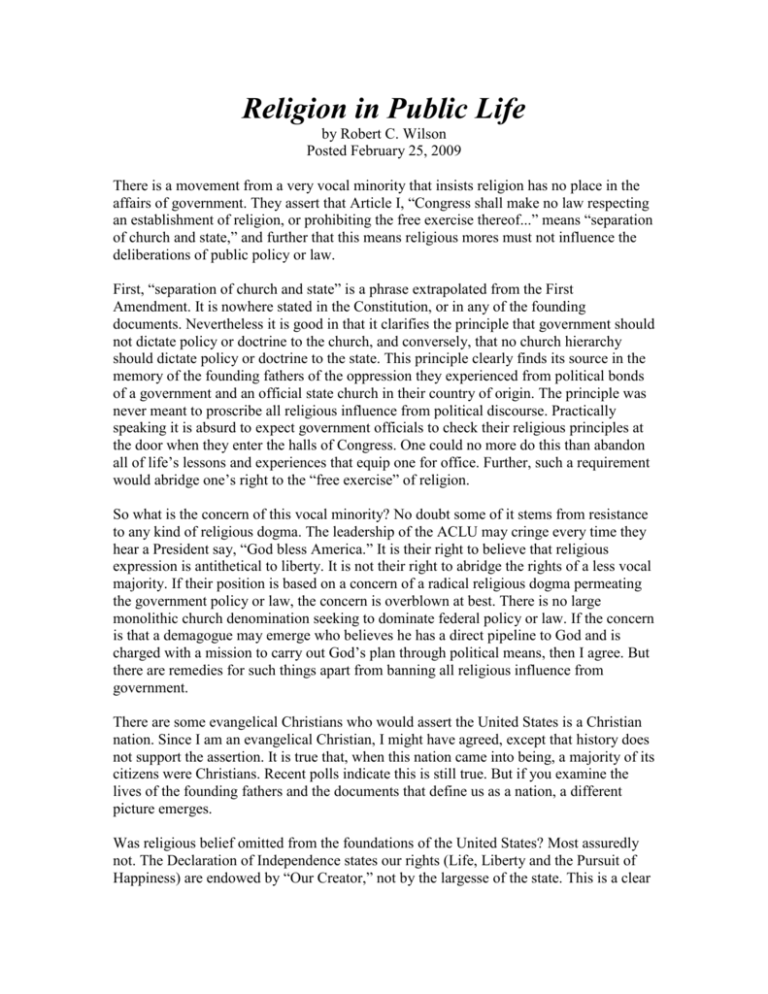
Religion in Public Life by Robert C. Wilson Posted February 25, 2009 There is a movement from a very vocal minority that insists religion has no place in the affairs of government. They assert that Article I, “Congress shall make no law respecting an establishment of religion, or prohibiting the free exercise thereof...” means “separation of church and state,” and further that this means religious mores must not influence the deliberations of public policy or law. First, “separation of church and state” is a phrase extrapolated from the First Amendment. It is nowhere stated in the Constitution, or in any of the founding documents. Nevertheless it is good in that it clarifies the principle that government should not dictate policy or doctrine to the church, and conversely, that no church hierarchy should dictate policy or doctrine to the state. This principle clearly finds its source in the memory of the founding fathers of the oppression they experienced from political bonds of a government and an official state church in their country of origin. The principle was never meant to proscribe all religious influence from political discourse. Practically speaking it is absurd to expect government officials to check their religious principles at the door when they enter the halls of Congress. One could no more do this than abandon all of life’s lessons and experiences that equip one for office. Further, such a requirement would abridge one’s right to the “free exercise” of religion. So what is the concern of this vocal minority? No doubt some of it stems from resistance to any kind of religious dogma. The leadership of the ACLU may cringe every time they hear a President say, “God bless America.” It is their right to believe that religious expression is antithetical to liberty. It is not their right to abridge the rights of a less vocal majority. If their position is based on a concern of a radical religious dogma permeating the government policy or law, the concern is overblown at best. There is no large monolithic church denomination seeking to dominate federal policy or law. If the concern is that a demagogue may emerge who believes he has a direct pipeline to God and is charged with a mission to carry out God’s plan through political means, then I agree. But there are remedies for such things apart from banning all religious influence from government. There are some evangelical Christians who would assert the United States is a Christian nation. Since I am an evangelical Christian, I might have agreed, except that history does not support the assertion. It is true that, when this nation came into being, a majority of its citizens were Christians. Recent polls indicate this is still true. But if you examine the lives of the founding fathers and the documents that define us as a nation, a different picture emerges. Was religious belief omitted from the foundations of the United States? Most assuredly not. The Declaration of Independence states our rights (Life, Liberty and the Pursuit of Happiness) are endowed by “Our Creator,” not by the largesse of the state. This is a clear statement of belief in God as a basis. The Constitution with its amendments protects the free exercise of religion. But neither Christ nor Christianity is anywhere even obliquely referred to in these documents. Were the founding fathers, who gave everything for the cause of liberty, atheists or agnostics? It is not clear if any of the authors and signers were of this persuasion. It is also clear that the most notable as leaders were not only men of character and integrity, but God fearing men. They were not all Christians. Some were deists who believed in a God who was more distant, but their thinking was profoundly influenced by JudeoChristian principles. Some quotes from these founders are listed below. John Adams “Our Constitution was made only for a moral and religious people.” “Liberty must at all hazards be supported. We have a right to it, derived from our Maker.” “Statesmen my dear Sir, may plan and speculate for Liberty, but it is Religion and Morality alone, which can establish the Principles upon which Freedom can securely stand…” “It is the duty of all men in society, publicly, and at stated seasons, to worship the Supreme Being, the great Creator and Preserver of the universe.” Samuel Adams “In the supposed state of nature, all men are equally bound by the laws of nature, or to speak more properly, the laws of the Creator.” Benjamin Franklin “I have lived, Sir, a long time, and the longer I live, the more convinced proofs I see of this truth – that God governs the affairs of men. Alexander Hamilton “To grant that there is a supreme intelligence who rules the world and has established laws to regulate the actions of his creatures; and still to assert that man, in a state of nature, may be considered as perfectly free from all restraints of law and government, appears to a common understanding altogether irreconcilable. Good and wise men, in all ages have embraced a very dissimilar theory. They have supposed that deity, from the relations we stand in to himself and to each other, has constituted an eternal and immutable law…” Thomas Jefferson “Can the liberties of a nation be thought secure when we have removed their only firm basis, a conviction n the minds of the people that these liberties are the gift of God?” “The God who gave us life, gave us liberty at the same time; the hand of force may destroy but cannot disjoin them.” James Madison “It is impossible for the man of pious reflection not to perceive in it (the Constitution) a finger of that Almighty had which has been so frequently and signally extended to our relief in the critical stages of the revolution.” George Washington "No people can be bound to acknowledge and adore the invisible hand, which conducts the Affairs of men more than the People of the United States." "May the father of all mercies scatter light, and not darkness, upon our paths, and make us in all our several vocations useful here, and in His own due time and way everlastingly happy. " "The blessed Religion revealed in the word of God will remain an eternal and awful monument to prove that the best Institution may be abused by human depravity.” So, is religious principle admissible in the deliberations of government in America? Everything in the attitudes of the founding fathers and in the documents that define our republic loudly affirm that our nation owes its existence and liberties to the providence of a just and gracious God, and that apart from any attempt of government to establish a state religion, all men must be free to exercise their religion according to the dictates of their conscience. Therefore bringing religious mores to the discussion of policy and law is not only admissible but is to be encouraged.
